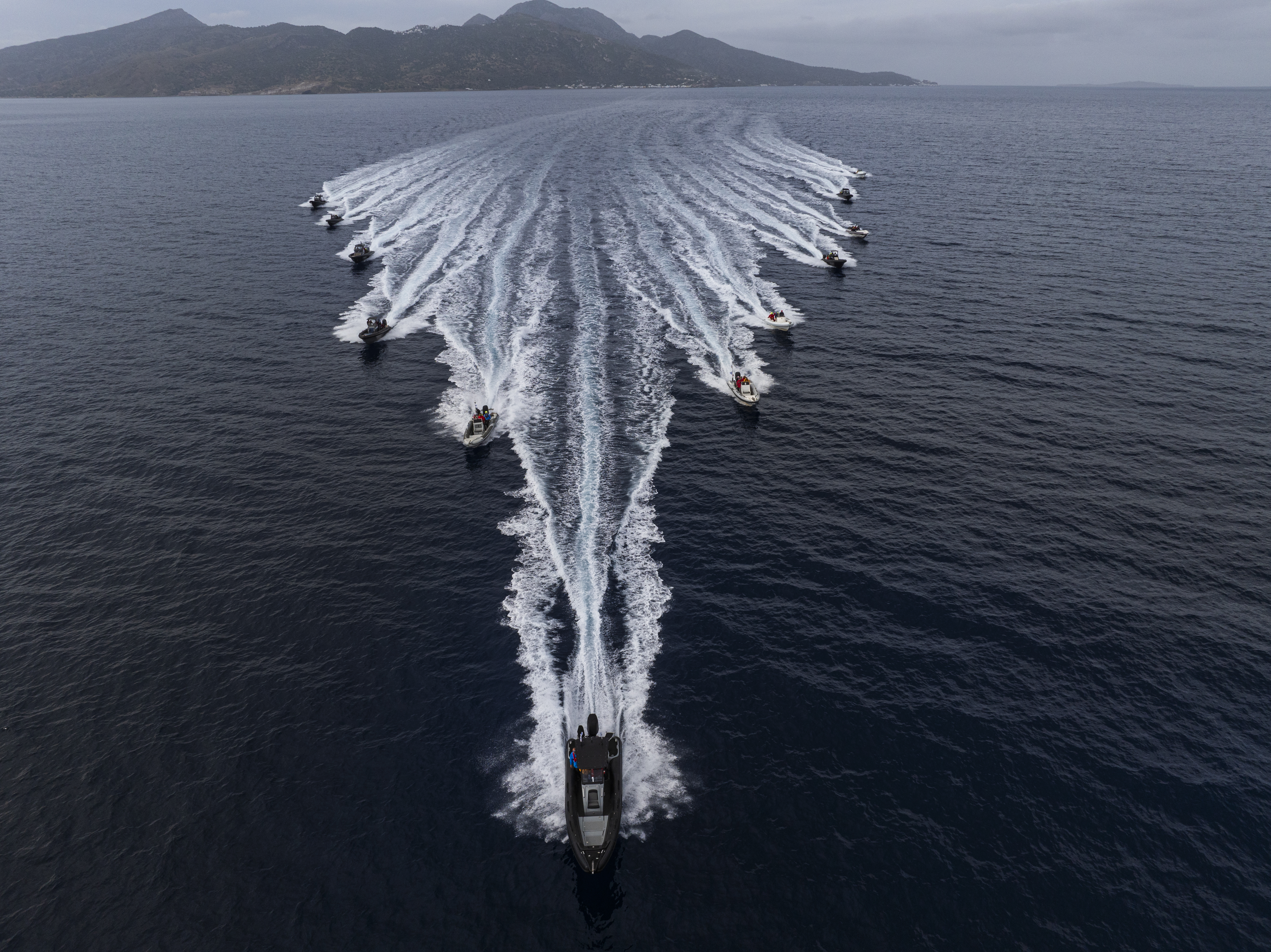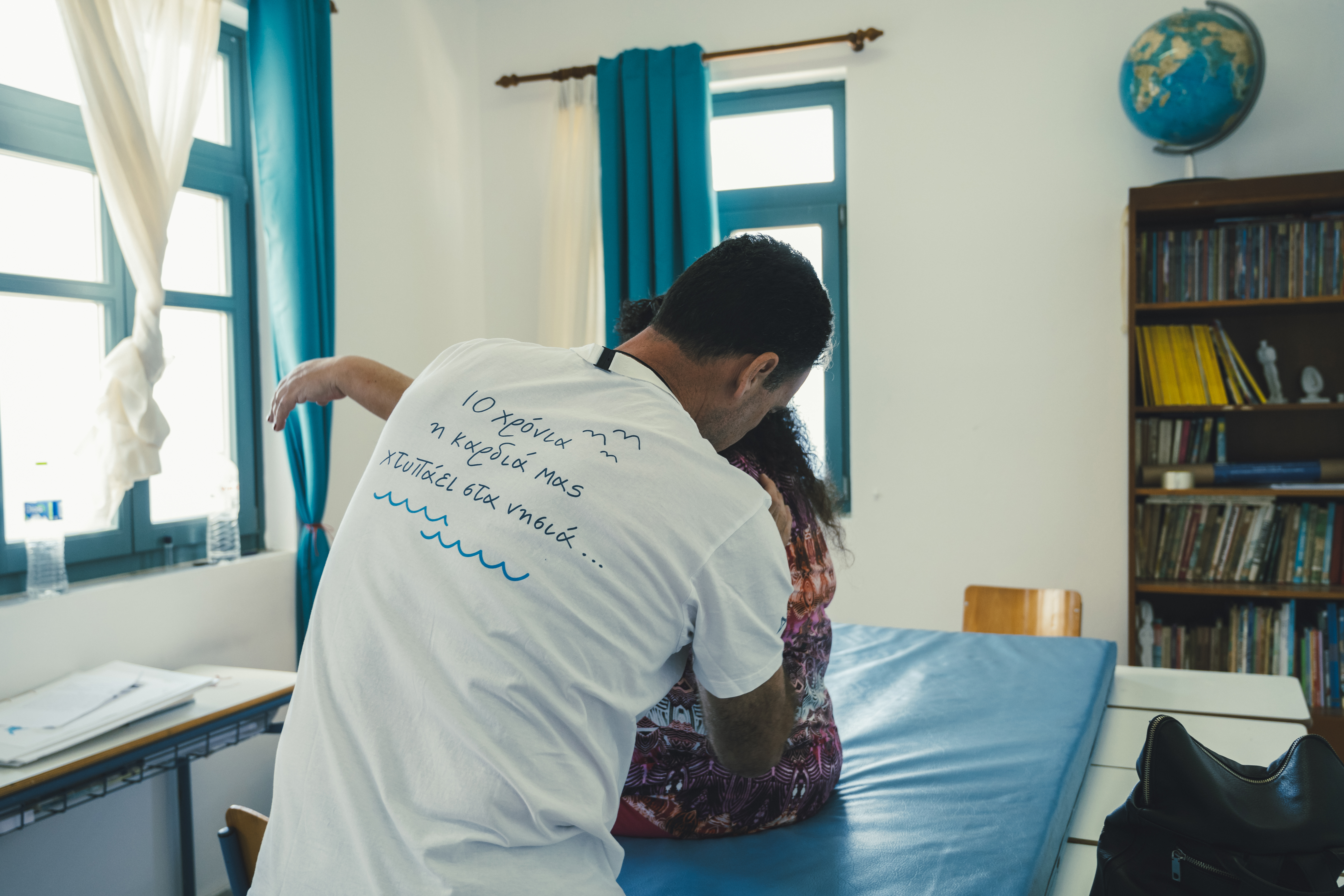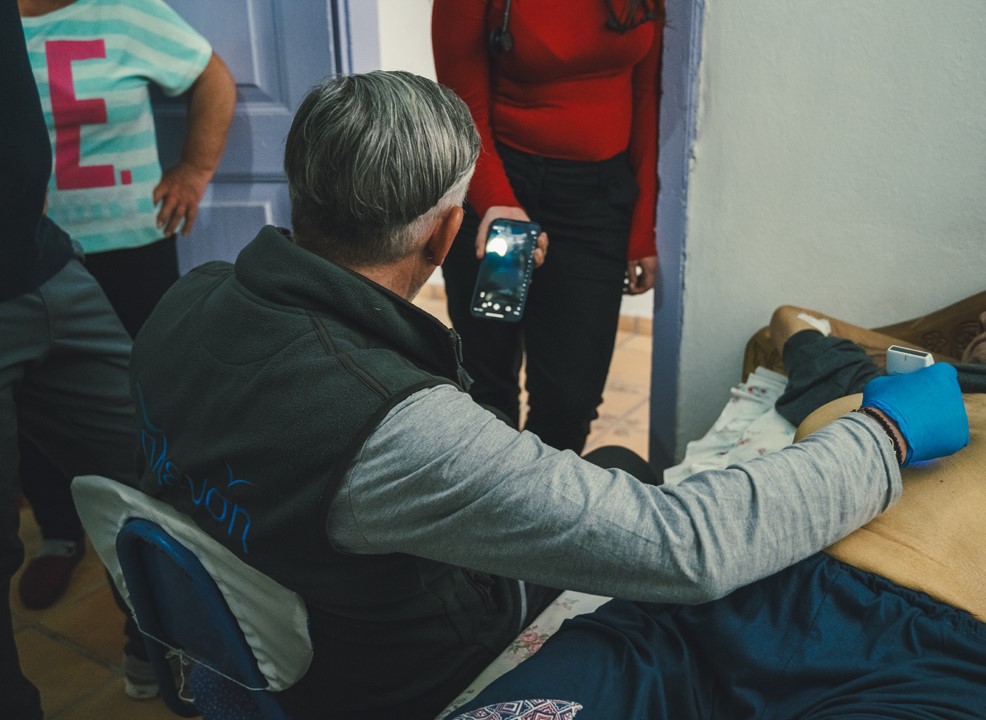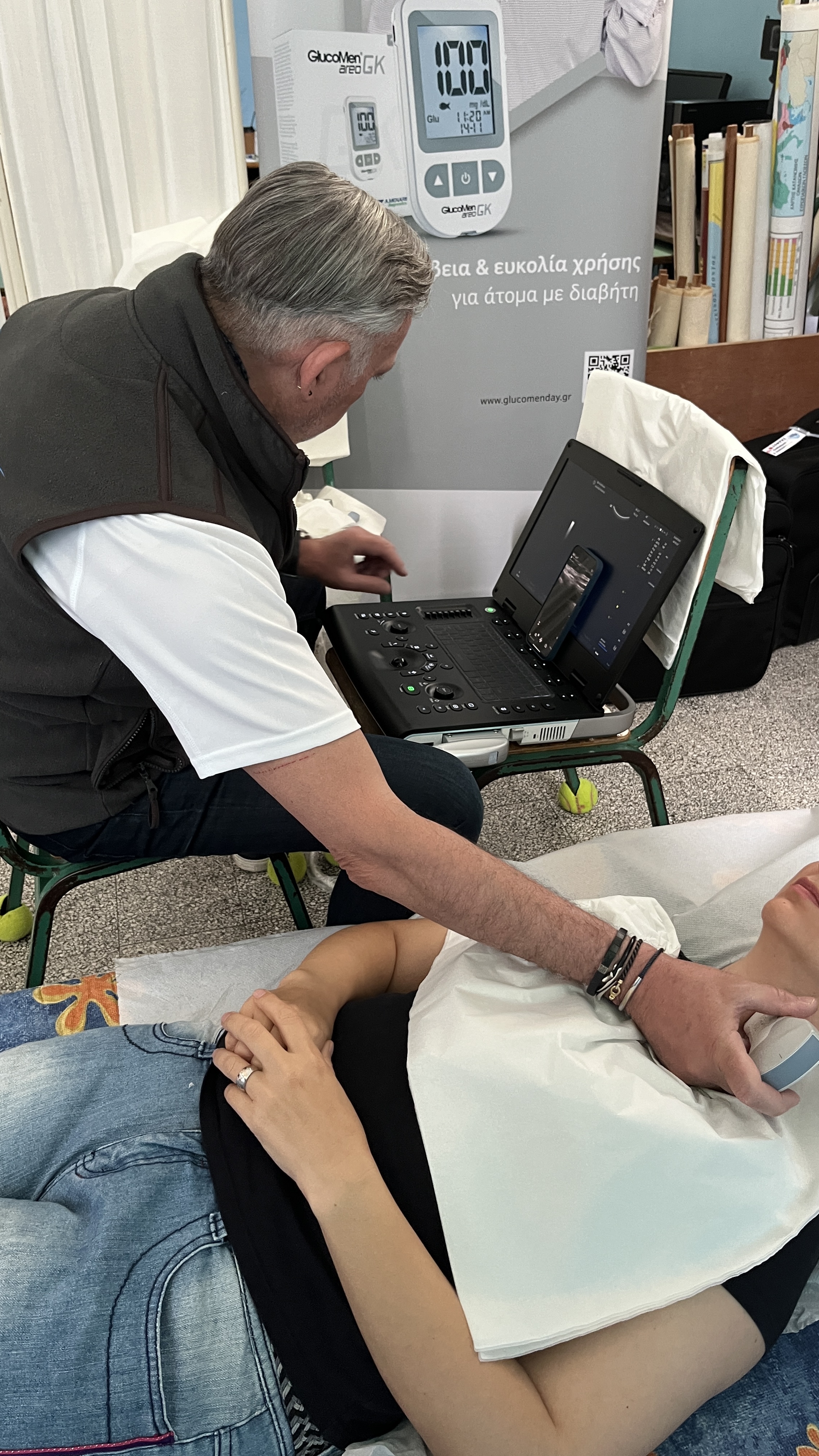In Nisyros, a tiny Greek island in the southern Aegean Sea, a man is in distress. He trembles with a fever, and his skin has a yellowish tinge. Clinicians are by his side, but they’re working off minimal information about the sickly man, who is not well known in the local community. He could be suffering from anything from an onset of influenza to ischemic colitis, a lack of blood flow to the colon that can quickly turn lethal.
One nurse slips a smartphone-sized device out of his pocket and holds the probe to the man’s abdomen. The wireless device, GE HealthCare’s Vscan Air ultrasound scanner,* relays a crystal-clear, real-time image of the patient’s internal body structures to his phone. It’s plain to see that the man’s belly is filled with liquid, a telltale sign of liver cirrhosis. “With no other signs of acute infection or malignant disease, this hepatic insufficiency seemed to be a consequence of chronic alcoholism,” explains Dimitris Dardamanis, M.D., M.Sc., a general surgeon and volunteer with Athens-based nonprofit Symplefsi.
There’s a collective sigh of relief. The diagnosis isn’t good news, but it’s not an emergency requiring a helicopter to airlift the man to a mainland hospital. They prescribe painkillers and antibiotics for his fever, arrange for local treatment of his alcohol misuse and continue their rounds. They’ve just made a fast, accurate and confident diagnosis, avoided the logistical and costly headache of an air ambulance transfer and preserved precious healthcare resources. “There’s no way we could have triaged him like that without the Vscan Air,” says Dr. Dardamanis, who spoke after returning from Symplefsi’s 10-day spring mission to a cluster of sparsely populated Aegean islands.
Quick, comprehensive diagnosis
GE HealthCare is boosting the ability of Greek clinicians to bring the same high-quality healthcare to regions of the Mediterranean country where equipment is patchy or nonexistent. Earlier this year, they equipped volunteers for Symplefsi, and another nonprofit called the Aegean Team, with several Vscan Air devices on their missions to the remote islands of the Aegean Sea. “It’s made our work significantly easier, especially for home visits to patients who couldn’t move,” says Georgios Plakogiannakis, M.D., an Athens-based cardiologist and long-serving volunteer with the Aegean Team.
“Our priority has always been to bring the very best basic healthcare to all Greek people,” says Tassos Eleftherakis, ultrasound sales manager for GE HealthCare. Widespread use of the Vscan Air would save thousands of island dwellers the long journey to larger islands or cities such as Athens and Thessaloniki to receive more focused treatment, he says. “It allows for more people to be examined quickly, qualitatively and comprehensively at the point of care.”
The mission to boost healthcare in remote regions
Bringing first-rate healthcare to every corner of Greece is a Herculean challenge. Geography is the biggest obstacle in the Mediterranean country, which contains around 6,000 islands. Just 200 of those are inhabited, explains Eleftherakis, with the least-populated islands lying the farthest from the mainland. For example, nearly 100,000 people live on the Ionian island of Corfu, which lies only a few miles from the mainland, while no more than a few hundred souls reside on the remote Dodecanese island of Halki.
“Whatever their population, these islands need doctors, especially for the children, pregnant women and elderly people,” says Dr. Dardamanis. But white coats are a scarce commodity in the country’s archipelagoes. Larger islands might have a few general physicians and a specialist or two, such as a cardiologist, but many of the smallest islands don’t have a single clinician in residence. This results in huge gaps in healthcare provision: “radiologists, dentists, endocrinologists, psychologists, ENT specialists, gynecologists, oncologists,” reels off Dr. Dardamanis.
Underlying the supply issues is a lack of enthusiasm for life in the wilderness. “Greek healthcare workers won’t live on remote islands, even if they’re paid more money,” says Dr. Dardamanis. For anyone who has seen the sun-drenched movie “Mamma Mia!,” set on a beautiful island in the Aegean Sea in the summer months, this might come as a surprise. But winters can be harsh in this corner of the Mediterranean, with months of chilly temperatures, gray skies and few visitors. “You can go weeks without seeing people,” says the general surgeon. Telemedicine is no panacea for the problem, since the technology still requires a clinician being present to use it.
Hence, visiting doctors are always given a warm welcome by islanders. Sometimes the welcome is too warm, explains Dr. Dardamanis. “Imagine the locals in a restaurant realize what you do,” he says. “They’ll gather round, asking you to look at their X-ray or explain what their blood test means.”
Crystal-clear images in a pocket-size package
Symplefsi and the Aegean Team now have ready answers to such questions. Both nonprofits are thriving, thanks to the enthusiasm of their volunteers. The Aegean Team was founded in 1995 and has just chalked off its 30th expedition to the small islands of the eastern Aegean Sea, a mission that involved more than 120 volunteers, 18 different medical specialties and 11 inflatable boats. Symplefsi is not far behind, having carried out 23 expeditions since it was founded in 2014. Each mission attracts around 100 volunteers with a wide range of clinical expertise.
Many of the volunteers have used GE HealthCare’s imaging capabilities in their clinics and hospitals for years, if not decades. “It was natural that they’d turn to us to ask for support for their efforts,” says Eleftherakis. “They are already very familiar with our systems, our tools, our buttons, with our processes, with everything.”
Before, GE HealthCare provided hospital-scale ultrasound systems to the two nonprofits, but their size and weight limited how many could be used. “They could only get a couple on board of one of the boats”, says Eleftherakis. The pocket-size, waterproof, military-standard drop-tested Vscan Air allows a single boat crew to take up to four or five devices with them on their missions. Packing major diagnostic capability into a back pocket is also the special power of Japan’s famous “Jet Ski Doctor,” who calls on elderly patients living in that country’s remote islands with his Vscan Air.
The dainty device also delivers crystal-clear images that are on a par with their larger counterparts. Clinicians can easily explain the images to patients and then send them on via email. The dual-headed probe allows clinicians to image both shallow and deep anatomy. “We can examine different organs, the complete abdomen, and even the blood vessels in soft tissue,” says Dr. Dardamanis.
Digital solutions promote faster analysis
The nonprofits can also leverage a suite of user-friendly digital tools to expedite their practice. For example, they can harness solutions that allow them to easily and securely upload images from the device to the cloud, allowing for remote analysis and diagnosis by clinicians in larger hospitals in mainland Greece. “That increases the confidence of diagnosis,” says Eleftherakis.
For example, one Vscan Air app harnesses algorithms that automatically calculate ejection fraction, which is jargon for how much blood the heart is pumping. The device can also send images and short videos to the cloud.
On their most recent missions, clinicians used the Vscan Airs on scores of patients, helping them instantly understand if they were dealing with an emergency, such as a miscarriage or ruptured organ, or a less serious condition, such as gallstones or indigestion. “GE HealthCare have always been by our side, offering portable medical equipment to facilitate our work,” says Dr. Plakogiannakis. “We are especially grateful and look forward to continuing our collaboration.”
*Donated by GE HealthCare.




